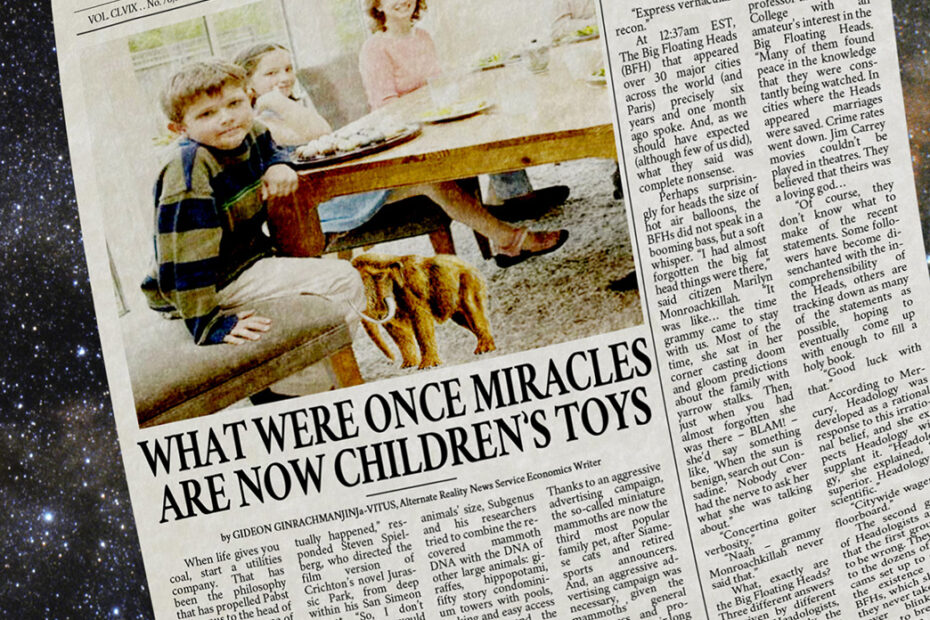by INDIRA CHARUNDER-MACHARRUNDEIRA, Alternate Reality News Service Fine Arts Writer
“Billy Pilgrim woke up.”
Thus begins the epic hypertext journey Billy Across the Multiverse. And, in a sense, that’s also where it ends.
Sure, the variations appear to be endless. Variations for every second of every day of the year: “Billy Pilgrim woke up at 8:31:32 on Friday, the 27th of April.” Variations for every possible emotion: “Billy pilgrim woke up certain in the knowledge that this was going to be a morally ambiguous day.” Variations of place: “Billy Pilgrim woke up lying very awkwardly on top of his flat screen TV.” And, of course, combinations of those possibilities: “Billy Pilgrim woke up sitting on the toilet of the downstairs bathroom at 17:07:08 on Friday, the 12th of November and already he looked forward to being bored stiff by the possibilities of the day.”
In all, author Margeurite du Panchervillas has woken Billy Pilgrim 2,367,452 different ways.
“Billy Across the Multiverse is an astonishing work of artistic obsession,” enthused literary critic and ozone smell fetishist Carl Rorschach. “Margeurite du Panchervillas devoted her life to creating a hypertext that would follow all of the possible choices made by her main character in the course of 24 hours. In 37 years, she only managed to see him through the first second!”
“Billy Across the Multiverse is an obsessive work of astonishing artistic pretention,” demurred literary academic Finley MacShankar, who holds the Guinness Book of World Records honourable mention for most adjectives used in a single sentence. “You have to plod through thousands of sentences just to get to one that is the least bit interesting, and then…you have to plod through thousands more to get to the next interesting sentence. Honestly, I would rather listen to somebody with a really annoying voice – I’m talking about an incredibly high-pitched whine, the kind of voice that makes your teeth grind down to the roots – read Vogon poetry!”
As literary scholars pore over the work, they are finding that not all of the choices are unique. The sentence “Billy Pilgrim woke up with a splitting headache and his pajamas on backwards.” was both sentence 236,901 and sentence 1,676,456. “At precisely 8:37:42 on Friday the 13th, Billy Pilgrim woke up, looked around him and immediately died of a cute embarrassment.” on the other hand, can be found at slots 45,237,045 and 1,998,045.
“Forgetful old cow,” MacShankar sourly commented.
“No, no, no,” Rorschach insisted. “It’s brilliant.” Even though the words are the same, he argued, the path by which you get to them is completely different, imparting to them very different meanings. “You never wash your camel in the same industrially polluted river twice,” he pointed out. Nobody is quite sure what he meant, or how it applies to the present situation, but many admire his fluent use of ecometaphor.
More problematic are the sentences that have the same words, but different punctuation. Consider the difference between “Billy Pilgrim woke up brushing his teeth on the way to the Dunkin’ Donuts.” (variation 1,377,208) and “Billy Pilgrim woke up; brushing his teeth on the way to the Dunkin’ Donuts…” (variation 1,898,417).
“Although slight in form, the difference in meaning could not be greater,” Rorschach began, but was immediately cut off.
“Oh, shut up, you windy old Graf Zeppelin,” MacShankar stated. “I’m the expert, here.” It’s true: Pusillanimous Punctuation: The Use of Commas in the Work of Virginia Woolf, his first book, was the last word on the subject. “This isn’t about art. du Panchervillas probably just momentarily drifted off and hit a couple of punctuation keys by accident!”
Some (Roy Some, noted literary agent and decorated veteran of the battle of Colluden) suggested that it is unfair to judge Billy Across the Multiverse because it is unfinished. “No work of art is ever truly finished, though, is it?” Rorschach mused. “It’s only ever stopped.”
“Oh, stop,” MacShankar responded. “This isn’t a work of art. It’s over two million opening sentences looking for a short story!”
Rumour has it that in the final year of her life du Panchervillas was contemplating adding another second of time to her story. Intriguingly, her hard drive contained the fragment “He pulled himself upright, yawned and look”.
Had du Panchervillas not died, might we have learned more about Billy Pilgrim and the world he lived in? Or, would we have had two million additional nonsensical story fragments? As du Panchervillas wrote: “Billy Pilgrim woke to the nothing new.”


